

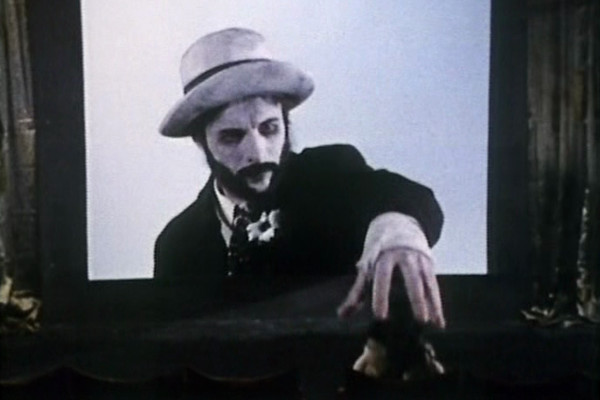
The second episode to win a Silver Rose at the Festival Rose d'Or, the reputation of The Movies largely rests on the final eight minutes, which present a continuous stream of imaginative visual gimmicks and inspired camera tricks. With all three Goodies determined to do their own film to aid the ailing British film industry, their collective egos clash, and all three movies merge into one, with commendable skill.
However, to praise the episode just on the final sequence alone is to do it a disservice, as the earlier film parodies are also well performed, and it's a programme that credits its audience with the intelligence to know the names of foreign directors. The episode is one of four from the fifth series to have a commentary track... while Lighthouse Keeping Loonies and The End have amiable yet inessential chats, The Movies sees Bill in an engagingly bitchy mood throughout.
As discussed with the entry on The End, these commentary tracks aren't included on the otherwise excellent new boxset, so the earlier compilation DVDs of selected episodes are the only option if you want to hear these discussions.

Although the peak of The Goodies came with series four and five, one thing the later, pacier episodes perhaps left behind were more thoughtful, leisurely gems like this one. Rarely discussed in favour of other, more famous episodes, Pollution gives us a tale of the government building a department that deliberately pollutes the atmosphere so that they can put it all back to how it was, thereby creating jobs and boosting the economy. As a concept it's a wild, satirical idea, yet also one which sounds oddly plausible.
This is also the first episode to feature Graeme in "mad scientist" mode, making a serum that can cause clouds to rain grass-growing produce, and they take the trandem up in the air for the very first time in order to do it. Yet what really sticks out in the mind is a downbeat, almost heartbreaking montage where the Goodies travel through the countryside seeing the devastation that's unfolded, including radioactivity and acid rain. As the first Goodies episode not to use the incidental music track "Needed", it instead gives two versions of an affecting track known as "Changed".
In terms of Goodies episodes that will make you laugh out loud, then Pollution wouldn't come into the discussion, though it is amusing and scathing throughout. But in terms of episodes that have something to say, it's hard not to be struck by some of the lyrics to Bill's song: "But I don't believe, we'll be able to breathe. They've taken the sun, and oh what have they done to the country? [...] And is it true? The oceans use to be blue? Once there was water, and fish to be caught at the sea." The master tapes of the track were kept, and it appears on a special, limited-edition CD release of songs from the series.

Camelot contains the brilliant conceit of the world of ancient Camelot... in a modern terraced street in Solihull. Such ludicrous leaps of imagination are aided greatly in the best Goodies episodes by them having a strong sense of internal logic that sees every plot point develop naturally from the most unnatural of situations. Alfie Bass is a terrific guest star, possessing real chemistry with the trio, and the range of loveably corny jokes even extends as far as having them break the fourth wall, Tim acknowledging the studio audience while performing as a stand-up court jester.
The month after this episode aired, the Goodies released their first album, The Goodies Sing Songs From the Goodies (rereleased in May 1975 as The World of the Goodies) containing 11 tracks, 8 of which had featured in the episodes themselves. One of those tracks was Taking You Back, the striking song that is featured twice in this excellent episode.
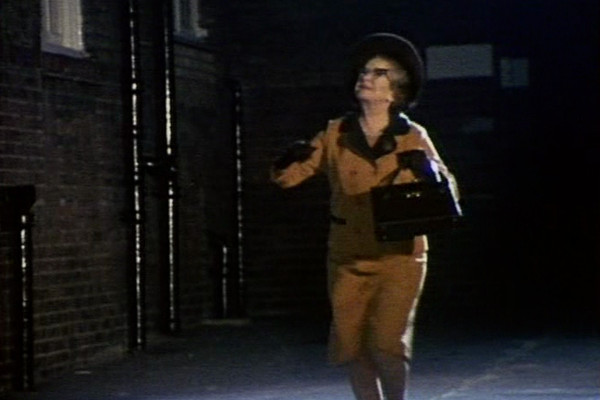
One of the sharpest and most satirical Goodies episodes ever made, concocted after the first series of the programme was publicly praised by Mary Whitehouse of the National Viewers' and Listeners' Association. Frustrated by Whitehouse's praise, Gender Education was created entirely to annoy her, though it wasn't until 1980 that she finally complained to the BBC, after the episode Saturday Night Grease featured an illustration of a carrot on Tim's underwear.
Featuring an obvious parody of Whitehouse known as Mrs. Desiree Carthorse, the character is brilliantly brought to life by Beryl Reid, giving arguably the best guest performance in the entire series. As a hyper-repressed campaigner, she gives the Goodies one of the few "for hire" plots of the second series, requesting them to make the education film "How To Make Babies By Doing Dirty Things."
There's a wide contrast in quality between many of the series two episodes, and it's almost hard to believe that the same writing team who crafted something as shallow as Double Trouble that same year were behind something as savagely satirical and observed as this. Despite the presence of such a strong guest "villain", the episode also has time for only the second instance of one of the three leads turning against the others: Bill wittily gets driven insane by too much sex and violence on TV, and goes on a rampage to the memorable track "Bezerk".
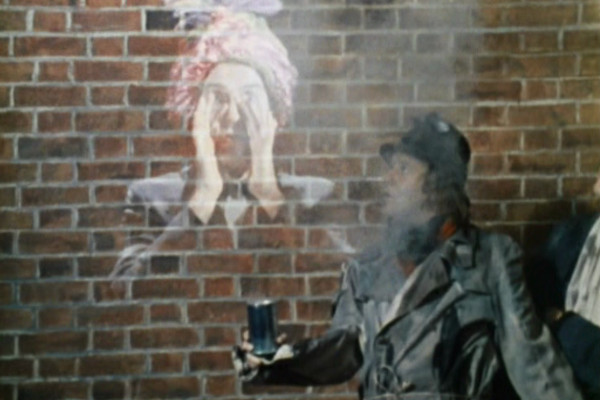
"Kid's programme!"
Although Michael Palin's diaries contained disparaging remarks about this instalment, based on Bill Oddie's description of it to him in private conversation, John Cleese appears, giving the oft-used detraction of The Goodies as seen in the title quote. Both teams were friends and had worked together in the past, though by this stage Cleese had left Monty Python and the series ended the same month this special aired.
Like Camelot, The Goodies and the Beanstalk is a true Goodies classic, featuring not only another great turn from Alfie Bass as one of their finest guest stars, but a tour-de-force of inventive visual humour.

The Goodies has never truly received its full respect as a satirical programme, perhaps because satire made up a relatively small part of its output. The group were just as happy to rework pantomimes or have giant kittens terrorise London as they were to tackle political issues, and so it often gets overlooked.
Then there's the fact that, despite being well-meaning, the series is so tied into its 70s mindset that even when they use the programme as a political mouthpiece (as here), it often gets confusing as to what they're actually trying to say. While South Africa is a clear attack on apartheid, and wholly worthy as a result, it's still an episode that has the regulars say words that even the Daily Mail refused to print.
Frustratingly, clips from the episode were used in the second of a two-part series on Channel 4, It Was Alright In The 1970s, to illustrate racism on television. While there are at least half a dozen instances of The Goodies indulging in material that is of a racially questionable nature, South Africa is clearly ironic and scathing of racism, using those tropes to satirically attack a regime. Oddly, while using the right clips to make the wrong point, the programme neglected to feature the ending, which is problematical: all three leads using shoe polish to integrate in an England taken over by black South Africans; the voices of said South Africans dubbed by the Goodies themselves.
Sadly, on 22nd November 2014, viewers were presented with comedians giving shocked reactions to the racial language, while the normally verbose Bill Oddie struggled to find words to defend it, and it was left to narrator Matt Lucas to justify the episode for him. This was an especially odd occurrence as Oddie reacted as if he was seeing the footage after many years distance, whereas it was released onto DVD in 2010 with their most essential commentary, Bill discussing at length the noble motives behind it.
Bill's assessment on the commentary that "maybe we were overreaching ourselves by making a serious point in a silly programme" is unfair on themselves. (Note that, once again, while the The Complete BBC Collection is an excellent boxset, it doesn't contain these commentaries) In all, this is one of the most important Goodies episodes, in that it shows that it was more than just throwaway TV... even if today it's more than a little difficult to watch.
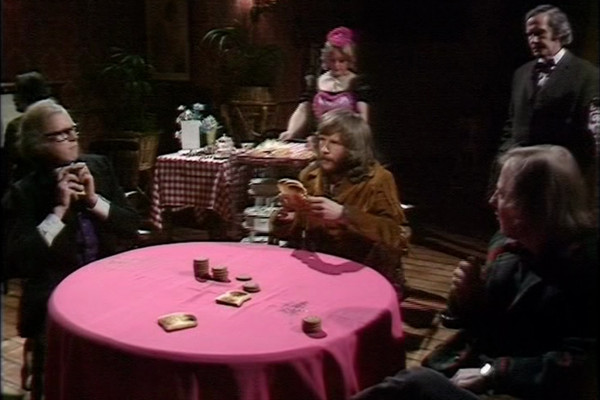
As discussed with series four, many of the best Goodies episodes operate with a precise series of internal logic that makes all the gags work. An opening situation, however ludicrous, is established, and then all the situations occur naturally as a result of it, the jokes emerging organically. Here they have the genuinely clever-silly absurdity of a cream mine, and take it to its (il)logical extremes, culminating in the titular bunfight. Relentlessly inventive, while elements like the "card" game are standouts, the entire episode is full of highlights, with even their puns and wordplay, often a low point of their humour, well-crafted and inspired.
Throughout these reviews I've referred to Bill's background songs as "incidental music", which is perhaps not strictly accurate, as such a term would more apply to instrumentals only, not tracks with lyrics and so on. Yet while clearly audible, tracks like "Working The Line" are there as background music to accentuate the action... for the first time here we get a track that's intended to be not only heard, but regarded as part of the narrative, the audience laughing along to Bill's words as he narrates the final action with the "Ballad Of The O.K. Tea Rooms".
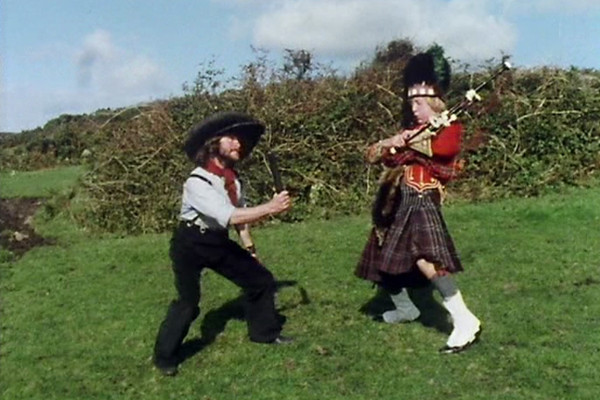
Probably the second most famous episode of The Goodies after Kitten Kong, no overview of Kung Fu Kapers can be complete without mentioning that a viewer had a fatal heart attack while watching it, due to laughing so hard. It's not difficult to see why, as once the episode introduces the central concept of "Ecky Thump" - hitting people over the head with black puddings as a martial art - it doesn't let up. Ultimately, whether or not you find this episode funny comes down to whether you find the idea of people putting on a mock Lancashire accent and hitting each other with puddings amusing. It's an episode with some literary allusions and a remarkably developed world, and it's an episode that has a unique identity that could only belong to The Goodies.
In modern terms you could argue that the various area stereotypes are prejudiced, but of particular note is Garden in blackface, doing a Muhammad Ali routine that evolves into an Al Jolson impression. It's troubling, because it undermines all the work they were doing elsewhere in slating this kind of thing, and, as it appears in the title sequence for the remainder of the BBC series, it does have the effect of making The Goodies a programme with around 50% of its output containing racially questionable material. There's also the word "poof" used as an insult, and a woman being penetrated, off camera, by one of the radio-controlled black puddings. As always, such things are noted as historical reference, rather than a criticism per se, as Kung Fu Kapers stands up as a very funny episode forty years on, with the Goodies even allowing Nationwide presenter Michael Barratt to upstage them.
Three months after the episode aired, an attempt was made to trade in on its popularity with the single "Black Pudding Bertha (The Queen of Northern Soul)", which even began with the exclamation "Ecky Thump!" The song hasn't aged particularly well, and clips of the the Goodies performing it may be significantly less amusing than the episode itself, but it was their third highest-charting single, reaching No. 19. The single was affectionately mocked in the programme, Graeme disparaging the lyrics in series six's Hype Pressure.